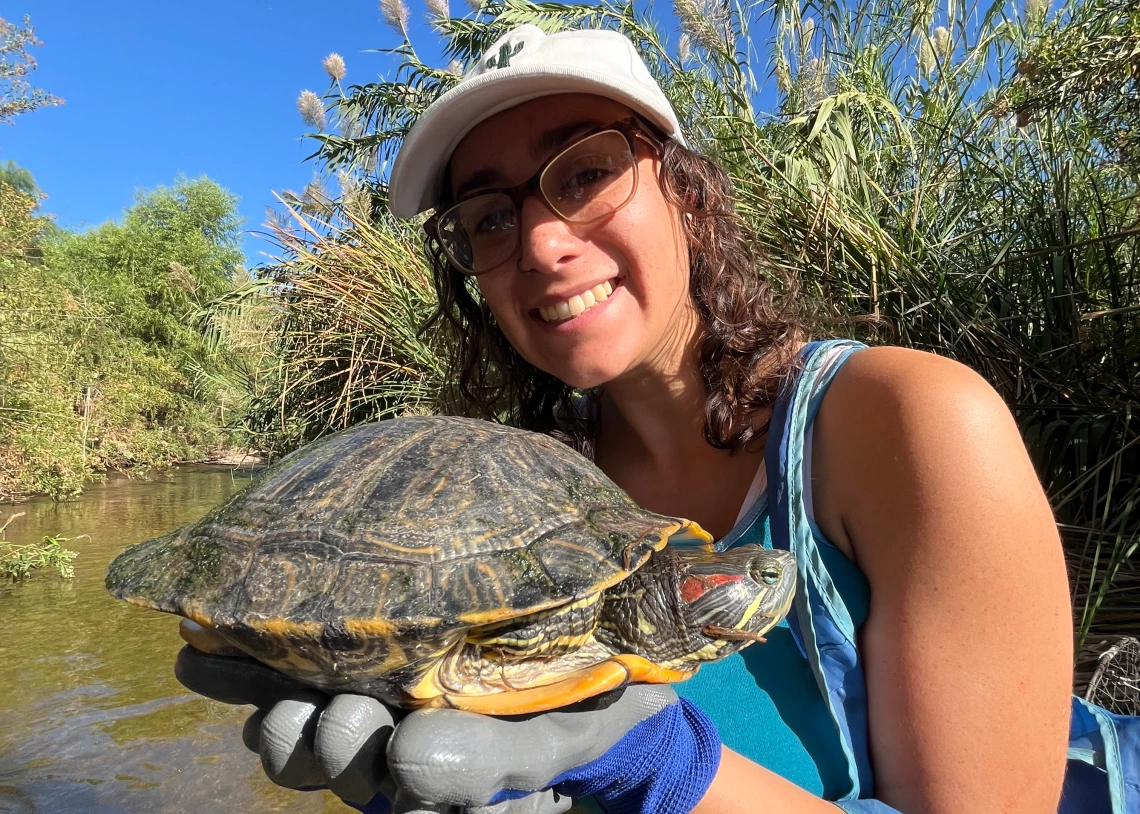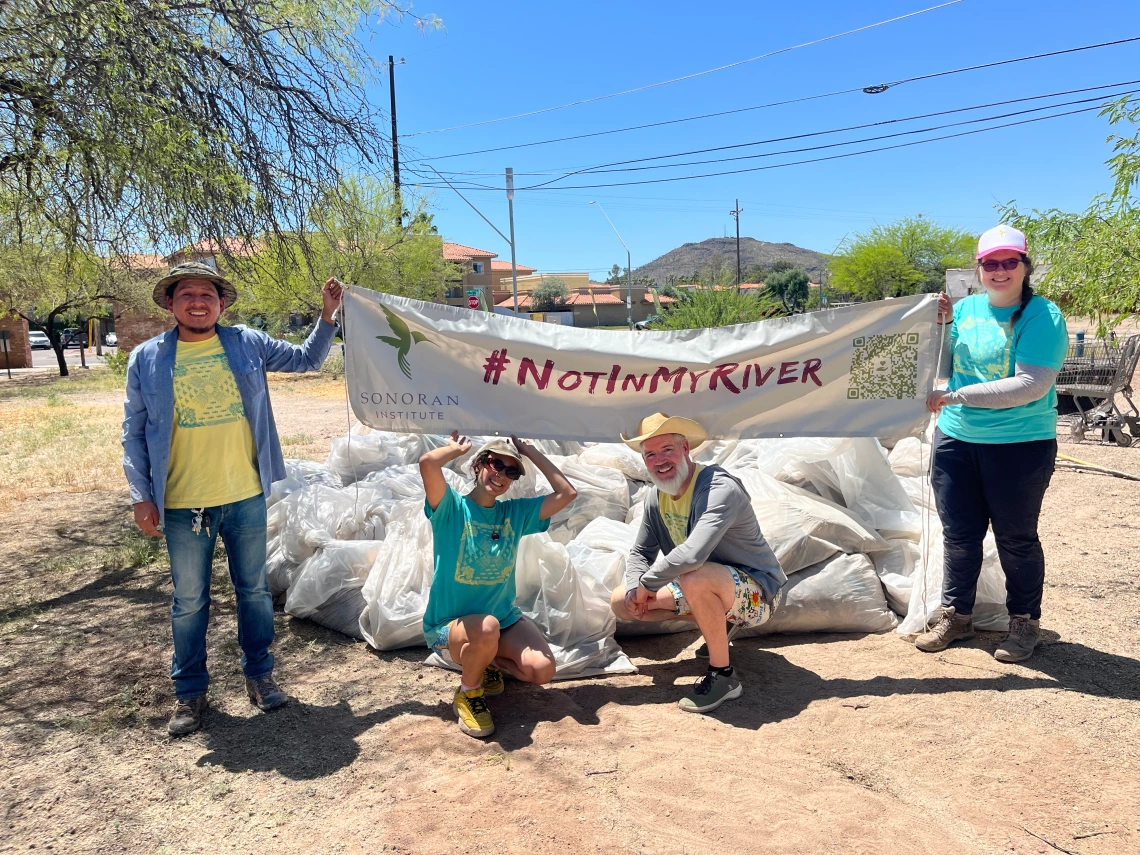Stephanie Winick: Inspiration, Intentionality, and Impact in Student Life

Stephanie Winick is a senior double majoring in environmental science (emphasis in soil, air and water), and Spanish (emphasis in linguistics), with a minor in Portuguese.
Throughout her time at the U of A, Winick has been involved with a variety of environmental programs at the University of Arizona that have each broadened her knowledge, community, and skillset.
“With cultural knowledge, scientific studies and determination for betterment, I hope to make a significant positive impact on the world and its environments,” Winick said.
In this Q&A, Winick discusses the value of learning from other students, how intentional everyday actions can contribute to bigger change, and her goals to pursue a career dedicated to environmentalism.
How have you been involved in environmental or other activities as a student at the University of Arizona?
I have been involved in environmental activities since my arrival at the University of Arizona my freshman year. I chose to major in environmental science and quickly gravitated into friend groups within ENVS who introduced me to Students for Sustainability, where I joined Hydrocats.

I benefited from perspectives and intelligence of older students in projects such as replacing sink aerators, measuring toilet flow, and rainwater harvesting. One of the first meetings, a guest speaker came in, and I still remember that he said that 40% of the water that the University of Arizona uses is for Air Conditioning!
My sophomore year, I also joined the new pre-professional co-ed environmental fraternity on campus: Epsilon Eta Tau Chapter. It was lovely to join a new club with a group of students with extreme bubbling passion, same as me. We do fun events together such as thrift swaps, tree plantings, and more!
How do you hope to incorporate environmental or sustainability values into your future career goals?
My future career goals are centered around incorporating environmental and sustainable values. My life goal since high school is to see the change that I want to create in a community. Gaining knowledge on what is sustainable is a long process with a lot of positive and negative feedback.
Specifically in the future, I hope to advance water purification and management to combat the global freshwater crisis. I am lucky to live in a time and place where I am able to spend my career working to pursue environmentalism.
Are there any specific aspects of sustainability or the environment that you are particularly passionate about?
At this time in my life, I am most passionate about actionable, daily sustainable practices. As college students, there is only so much we can do to make our world the better place we want it to be.
Making mindful decisions regarding food, plastics, and carbon footprint is a very simple way to practice sustainability. For instance, we can advocate for eating plant-based meals, carrying around reusable everything (bags, utensils, bottles), and supporting carpooling and public transportation.
Where have you found community while at the University of Arizona, particularly in terms of connecting with students who are also interested in the environment?
I have found environmentally-interested communities at every least-expected corner of campus. I believe many people at the school practice environmentalism in their own manner, and I love learning from people about what they know.
I have created the deepest connection with Epsilon Eta with regards to students interested in the environment. At the start of my time as Vice President of Programming (Community Service and Philanthropy), I had many ideas, but I was not sure I could pull any of them off. As I turned my ideas into reality, I received wholehearted support from my Etas and was able to change the structure and dynamics of the club according to new environmental focuses. For instance, I started a recycling pickup program and environmental education presentations every week at chapter.
Moreover, I found community in our partnerships with outside organizations such as the Sonoran Institute, Tucson Clean & Beautiful and the Arizona-Sonora Desert Museum. All this made me feel confident that I can make a difference with my community!
How do you think students can contribute to encouraging more sustainable behaviors and decisions in places like the U of A?
Most of all, I feel students should be encouraged to do three things: First, be more conscious. Second, notice things. And third, ask questions! Don’t be overwhelmed by the bad, instead focus on things you see throughout your day that you could make better.
For example, we can practice behaviors around campus like recycling and composting to the maximum extent possible, in accordance with university rules. Asking each other questions and creating unified ideas are the best next steps. More sustainable behaviors and decisions happen best when people work together.

What benefits can students gain from getting involved with professional development opportunities, such as the Earth Grant Program, internships, or the various other programs you’re a part of?
I very much appreciate all of the collaboration and support that I received from internships with the Earth Grant Program.
During my time working with the Sonoran Institute, I acted as a Santa Cruz River Trash Study Intern and performed data collection and analysis with my team to identify and measure which types of trash were most prevalent in our riverbed. Another large part of this internship was conducting trash cleanups where hundreds of community members would gather to clean up upwards of 3,000 pounds every time. Students can learn about conducting field work, community engagement, and data gathering and interpretation from programs like this.
In my current Earth Grant Internship, I am working with Productive Patches to install and promote water harvesting and permaculture in Tucson. I have the opportunity to learn about desert plants, better understand rainwater dynamics, and help prevent flooding from damaging houses and roads with help and collaboration from my coworkers.
Through any internship in the program, students can advance their studies and professional opportunities by learning from hands-on experiences where we can start our lives off making a difference.
Additionally, the Earth Grant class has brought me a wonderful group of people where we learn about each other, gain many skills, hear from cool guest speakers, and all-around have a great time while getting school credits.
Why should students care about the environment, even if it isn't their major or area of study?
Environmental initiatives are unique since every single major could incorporate them in some way. Art can be sustainable, negotiating policy can be sustainable, as can engineering, marketing, psychology, humanity majors, and everything else.
Our generation has to be the one who cares; eventually it will be too late. Students should lean into practices to be less wasteful. Everyone has experience with global warming, excess trash, and food waste. Doing little things every day goes a long way. We’re going to be the ones to save our environment, and every single student is included!!
